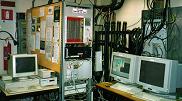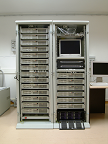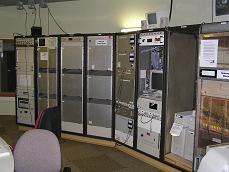| 
|
|
| 
Click
on the image to download a larger version |
Areal
view of the Northern Cross radiotelescope, near Bologna,
Italy. The Italian Pulsar Group has largely used this
instrument to observe radio pulsars. The observational
activity included timing observations coordinated with
the Compton Gamma Ray Observatory (CGRO), simultaneous
single-pulse observations coordinated with the European
partners, and pulsar searches.
© INAF
|
| 
Click
on the image to download a larger version |
The
pulsar data acquisition system built by the Italian group
at the Northern Cross, near Bologna, in Italy.
© INAF
|
| 
Click
on the image to download a larger version |
The
pulsar online data processing system built by the Italian
group at the Northern Cross, near Bologna, in Italy. The
system includes an online dedispersor and a powerful multiprocessor
system.
© INAF
|
| 
Click
on the image to download a larger version
|
The
pulsar offline data processing system built by the Italian
group and now installed at Cagliari. This a powerful Beowulf
computer, called "MANGUSTA", consiting of 40
processors, and includes several Terabytes of disk memory.
This system is extensively used to process survey data.
© INAF
|
| 
Click
on the image to download a larger version |
The European pulsar astronomers
have also used radio astronomical facilties spread out
in the world. In particular the British and the Italian
groups, have extensively used the Parkes radiotelescope,
in Australia, which led to the discovery of many hyndreds
new radio pulsars, including the first ever known double
pulsar.
©
ATNF
|
| 
Click
on the image to download a larger version |
A view of the advanced instrumentation installed at Parkes by
the British and the Italian groups.
© JBO, INAF
|

Click
on the image to download a larger version |
In Sardinia,
Italy, at 35 km North of the city of Cagliari, the Italians
are building a new radiotelescope, the Sardinia Radio
Telescope (SRT), which will be commissioned in 2007. The
Italian pulsar group is looking forward to use this facility
to observe radio pulsars.
© INAF
|
 |
Virtual animation of
the new Italian radio telescope, the Sardinia
Radio Telescope (SRT).
© INAF
download movie
|